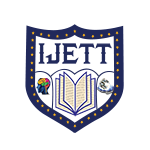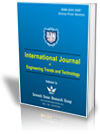Knowledge Management Applications & Technologies in the Digital Transformation Age
Citation
MLA Style: Osama A. Zamzami, Obey A. Mohsen "Knowledge Management Applications & Technologies in the Digital Transformation Age" International Journal of Engineering Trends and Technology (2020):38-44.
APA Style:Osama A. Zamzami, Obey A. Mohsen. Knowledge Management Applications & Technologies in the Digital Transformation Age International Journal of Engineering Trends and Technology, 38-44.
Abstract
The paper explores the knowledge management applications & technologies used in Saudi Aramco’s Area Information Technology Department (AITD), and illustrates digital transformation support in reaching knowledge management goals. The research chose the descriptive method, as it is most suitable to its nature and conforms best to the research problem. The study results revealed that there are 18 related knowledge management systems used by AITD. The identified systems mainly related to the following knowledge management technology types: knowledge elicitation, case-based reasoning, data mining, computer communication, office automation, knowledge repositories, and decision support systems. The study revealed that Skype, e- Learning, Shahed, ShareK, and Microsoft Office are knowledge management technology systems that support the company mobile workforce, especially under emergencies and pandemics.
Reference
[1] AlGahtani, S & Others (2010). Research Methodology in Behavioral Sciences. Riyadh: National Modern presses.
[2] Wong, K. (2015). “Critical success factors for implementing knowledge management in small and medium enterprises”. Industrial Management and Data Systems. 105 (3), 261–279.
[3] Daft, R. (2017). “Organization theory and design. Mason”, OH: Thomson South-Western.
[4] Regel, S (2020). What Distinguishes Personnel Development in the age of digital transformation. CoachHun. https://coachhub.io/blog/what-distinguishes-personneldevelopment- in-the-age-of-digital-transformation/
[5] Boashah, M & Mansoor, L (2012). “Knowledge management an orientation interview administrative organizations in the era of globalization”. International Scientific Conference: the globalization of management in the age of knowledge. Tripoli: Jinan University.
[6] Noy, H (2011). “Technological development and its role in activating the Knowledge Management Organization Business: The Case of the Directorate General of Algeria Telecom Foundation”. Algeria: Algiers University.
[7] Loermans, J. (2012). “Synergizing the learning organization and knowledge management”. Journal of Knowledge Management. 6 (3), 285–294.
[8] Ke, W. and Wei, K. (2016). “Organizational learning process: its antecedents and consequences in enterprise system implementation”. Journal of Global Information Management. 14 (1), 1–22.
[9] Kuo, Y. and Ye, K. (2010). “How employees’ perception of information technology application and their knowledge management capacity influence organizational performance” Behaviour & Information Technology. 29 (3), 287–303.
[10] Lin, C. and Tseng, S. (2015). “The implementation gaps for the knowledge management system”. Industrial Management and Data Systems. 105 (2), 208–222.
[11] Daft, R. (2017). “Organization theory and design. Mason, OH: Thomson South-Western”.
[12] [Bose, R. (2014). “Knowledge management metrics.” Industrial Management and Data Systems. 104 (6), 457– 468.
[13] Gottschalk, P. (2016). “Research propositions for knowledge management systems supporting it outsourcing relationships”. Journal of Computer Information Systems. 46 (3), 110–116.
[14] Ali, N., Sulaiman, H., & Cob, Z. (2014). “The Role of Information Technology for Knowledge Management Paradigm in Higher Education”. Journal of Information Systems Research and Innovation. 6, 59-67.
[15] Luan, J. and Serban, A. (2012). “Technologies, products, and models supporting knowledge management.” New Directions for Institutional Research. 113, 85–104.
[16] [Rizva, S (2020). Digital transformation in a postpandemic world. ITP.net, June 29, 2020 https://www.itp.net/news/93155-digital-transformationin- a-post-pandemic-world. Access date 6/29/2020
[17] [Chugh M., Chugh N., Punia D., and Aggarwal A. (2013). “The Role of Information Technology in Knowledge Management”. World Conference on Advances in Communication and Control Systems CACCS-2013, April 6-8, 2013. http://www.atlantispress. com/php/download_paper.php?id=6397 Access date 8/9/2019
[18] Memon, M., Shaikh, A., Memon, M., & Ahah, R. (2017). “Data Transformation with Interoperable Service Utilities in Hetrogeneous Transport Systems”. Sindh University Research Journal-SURJ (Science Series), 49(2).
Keywords
Knowledge Management Technology (KMT), Saudi Aramco Company, Area Information Technology Department (AITD)



